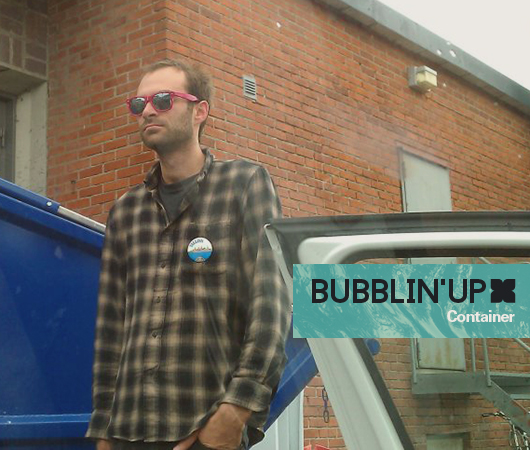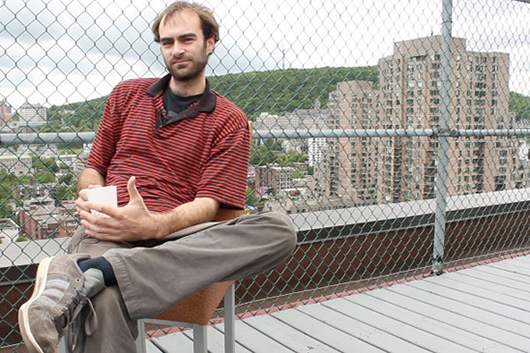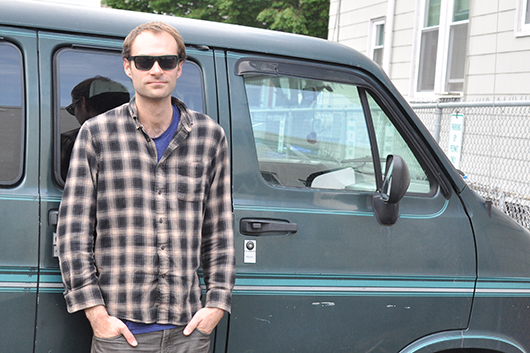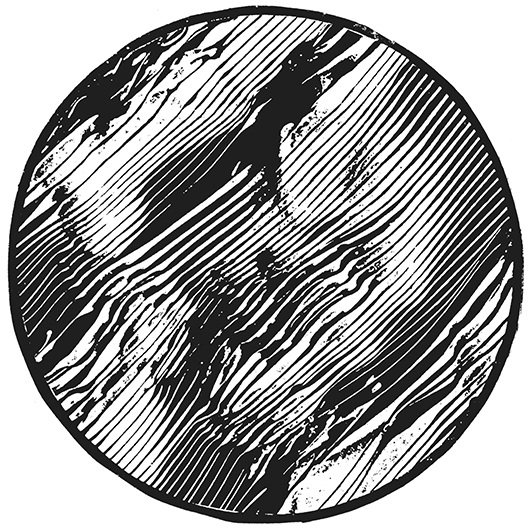Bubblin’ Up Week 2014: Container
Over the last few years, America’s DIY noise underground has undergone a noticeable shift, one […]

Bubblin’ Up Week 2014: Container
Over the last few years, America’s DIY noise underground has undergone a noticeable shift, one […]

Over the last few years, America’s DIY noise underground has undergone a noticeable shift, one that finds an increasing number of artists gravitating toward the sounds of house and techno. In the midst of this is Providence-based producer and musician Ren Schofield, who has steadily built a profile with the unconventional analog techno he makes as Container. Although the producer is understandably reluctant to see himself as part of a larger movement of noise musicians turning to synths and drum machines, he admits that the trend is a noticeable one. “That’s a huge thing,” he says. “There’s all these people who—maybe they weren’t involved in noise necessarily, but they weren’t involved in dance music and they are now. And that’s interesting.” He continues, “No one got together and was like, ‘Hey, we should all start playing techno.’ It was just something that was in the air and I think it just happened naturally that way. But where do I fit into it? I don’t know.”
Container was birthed around 2009 after Schofield—who came of age in the Providence noise scene of the early to mid ’00s—decided he wanted to work on a more beat-oriented project. “[I played] mostly drums for a few years, and then I kind of got into more electronic stuff,” he explains. “This was more in the noise end of things, there weren’t really beats at this point yet—mostly just tape manipulation and outdated electronics.” It was after this phase of experimentation with “things you could just patch together and make a racket with” that Schofield became interested in doing something closer to techno. “I’d been messing around with more rhythms and loops and stuff, and so that naturally progressed into beats.” He adds, “I had some old gear around that I knew was capable of beats, so I started messing around a little bit.”

Schofield cites legendary Providence noise bands Lightning Bolt and Arab on Radar as formative influences. Although those two groups superficially seem a far cry from the crisp, limber beats that can be found on any given Container release, the producer claims that they remain hugely influential for him. “Those two bands definitely changed the way I was feeling about music and what I knew about music, and so even if I wouldn’t have said that I was thinking about them when I was making Container songs, the influence is ingrained.” He continues, saying that although the goal of Container was to make relatively straightforward techno, “Naturally I’d sneak in tape loops and some distortion, because that’s just the way I do things.”
It was this fusion of his desire “to make regular, normal techno” with a deeply ingrained DIY methodology that led to the first, self-released Container cassettes. Schofield acknowledges that he was hardly a techno aficionado when he started the project, but says that he was inspired by a listening session of old, classic minimal tracks with his girlfriend and a group of friends. “That kind of got me interested in trying to do my own take on something like that, trying to see how I could interpret intuitively without very much research or anything.”
Following these initial cassettes—which were self-released on the producer’s own I Just Live Here label—Schofield was approached by old friend John Elliot (from the band Emeralds) about releasing something on his newly launched Spectrum Spools label, a subsidiary of Editions Mego. “I didn’t even know he had Spectrum Spools going, and he’d asked me about doing a Container release,” Schofield says. “At this point, I’d only had tapes out that I’d self-released, so when he asked me about doing a record I thought that he was just going to put it out on his own and maybe make a hundred copies or something.”

Container’s debut album—simply titled LP—was released by Spectrum Spools in 2011 and was in many ways a realization of the possibilities of the fusion of minimal techno’s rhythmic structure with noise music’s anarchic approach to sonic debris. Featuring sharp staccato beats, eerie synth atmospheres, and gritty, industrial production, the album was justly acclaimed as an iconoclastic, uncompromising take on many of the sensibilities that were bubbling up from the US underground.
In many ways, the association with prestigious European imprint Editions Mego
enabled Schofield to access both an audience and a legitimacy that otherwise might have eluded him, as Container occupied a tricky middle ground in relation to the dance music world. (It still does.) While he is the first to admit the difference between a sophisticated European techno night and DIY basement show in the US, Schofield has managed to straddle both worlds. “I’ll get to play the high-end festivals but then also the other shows. I like keeping it mixed up like that.”
The groundwork for this situation, where an ex-noise musician can play a set at Boiler Room and a grimy basement show in the same night, seems to be a reflection of the increasingly porous boundaries between the American DIY underground and dance music. Schofield sees this gradual opening up from within the noise scene as a good thing, and points to the resurgence of the synthesizer a few years back, with acts like Emeralds and Stellar Om Source, as a catalyst. “I think a lot of people got used to hearing different, cleaner sounds, and from there, it just kind of opened the possibilities. It’s weird that it happened all at once, but people just got interested in trying to do something new.”
Adhesive

Despite this evolution, it’s not as though Schofield has become a full-blown techno convert. Asked whether he listens to more techno now, he replies, “It’s not my favorite thing to listen to necessarily, but there are a few artists and projects that stand out that I love a lot, and that I wouldn’t have known about otherwise if I hadn’t really gotten involved in playing actual techno shows.” One of these artists is Powell—who last year had a release on Mute’s Liberation Technologies imprint, which will also issue Container’s new Adhesive EP later this month. “I wouldn’t say that he’s straight techno music and I don’t think we really alike necessarily, but I feel like we have some similar ideals.”
Schofield keeps his roots close, citing the influence of a DIY tour ethos and underground record labels. He also maintains a healthy suspicion of laptop-based performance. “The background I come from musically, it’s very rare to see anyone playing on a laptop, so I haven’t really developed a full appreciation for laptop performance. I don’t really like it that much.” He adds, “It’s just kind of a foreign thing, I’ve never made any music on a computer before, so I honestly don’t know anything about the programs.” Schofield’s own work is entirely composed and recorded on analog hardware. Going straight into a mixer and then into a computer running Audacity, everything is recorded live, with no overdubs. “I just play the songs a few times until I’m happy with the take that I get,” he explains.
Irrespective of his recording methods, Adhesive does suggest that Schofield’s sound is evolving. While his releases to date have all shown some degree of variation, Adhesive finds him subtly moving away from the linear techno structures that defined both Container LPs, and into noisier, although no less electronic, territory. “I definitely think that the new EP has a different vibe than anything else I’ve done,” he says. This slightly altered direction came about from writing and playing the EP’s title track live. “When I first wrote that song, I remember thinking it was a little bit different than all the other ones I’d been playing recently.” When it came time to record tracks for a new release, he’d gotten used to the industrial, post-punk sound of “Adhesive” and used this as the basis for the remainder of the EP’s tracks. “Normally, my writing process can take a long time,” he explains, “but I was just messing around and all the other three songs were probably written within a week in my studio in my apartment.”
Apart from his own music, Schofield also has clear plans for a new, vinyl-only record label that will exist alongside his tape label, I Just Live Here. “[I Just Live Here] still exists, but it’s not as active as it once was. I think last year I only put out two tapes,” he says. The new label is going to focus on underexposed artists who don’t yet have any releases. There are three releases lined up for sometime this year, and while Schofield is tight-lipped about the names of those involved, he says they are “people who I think are great that just need to have more people hear them. I’m not trying to put out any people who I think are already doing well.”
Of all the artists working at the intersection between noise and techno, it’s clear that Schofield is one of the most uncompromisingly committed to his ideals. In many ways, his recent material’s move away from what he calls “typical dancefloor techno” represents a return to the more squalid, abrasive textures of the DIY underground. At the same time, it’s a return that is thoroughly imbued with the rhythmic versatility and repetitive hypnotism that has always been present in Container releases. Given that, it’s just about impossible to predict exactly what direction Schofield will go in next, but the future of his Container project seems all the brighter for it.

